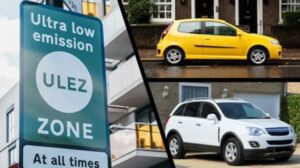Is the car BHP checker the only way to improve its performance? In today’s market, a car’s performance is one of the most important factors. The desire for more power never goes away, whether it’s because you enjoy floor-pushing for an adrenaline rush or because you need more strength to navigate various terrains.
Furthermore, we constantly consider overall performance into the car’s Horsepower (HP) or Brake Horsepower (BHP), this is the maximum power an engine can produce and used to determine a vehicle’s horsepower rating.
How was horsepower metric invented?
A horsepower is a unit introduced by engineer James Watt who calculated that “an average horse could do 33,000 foot-pounds of work per minute.” While his formula was not related to cars by any means because they were not present during his time, there was no better unit to measure power when engines were invented.
Generally, the more HP a vehicle produces, the better it accelerates, which is a robust aspect of its typical performance. However, many other factors also contribute to a vehicle’s performance.
We will not discuss that because that is not our point of concern right now.
What is the difference between HP and BHP?
There is a minor distinction between these two terms; the ‘Brake Horsepower’ (BHP) considers power loss due to friction, while the ‘HP’ does not.
It means the BHP is slightly less than the HP because it is calculated after the mill feds to the working parts like a turbocharger, water pump/ alternator, gearbox, and drivetrain.
The auto companies calculate BHP by forcing the engine to full revs and then allowing decelerating it to a dead end.
What’s the difference between PS, KW and BHP?
PS, KW, and BHP are all units of power used to gauge how quickly a task is completed or energy is transferred. However, they are commonly used in different regions and contexts. Here’s the difference between them:
- PS (Pferdestärke): PS is a power unit commonly used in Germany and other European countries. It is a German term meaning “horsepower” and is equivalent to the metric horsepower. One PS is defined as 735.5 watts.
- KW (Kilowatt): KW is the metric system’s international standard unit of power. It is widely used globally and is a more universally recognized unit. One kilowatt is equal to 1,000 watts.
- BHP (Brake Horsepower): BHP is a unit of power commonly used in the United States and other countries influenced by the British system of units. It is defined as the power output of an engine measured at the engine’s crankshaft without any power losses due to external accessories (such as the alternator, water pump, etc.). BHP is often used to measure the power of internal combustion engines, particularly in the automotive industry.
In summary, PS and KW are similar units of power used in different regions, with KW being the more commonly recognized and internationally used team.
BHP is another unit of power used primarily in the United States and is specifically related to measuring the power output of internal combustion engines.
What BHP is my car?
Unquestionably, a car’s BHP is a decisive factor in determining its health and performance figures. Therefore, we strongly advise taking our instant car BHP checker.
Yes, it is ‘Instant,’ ‘accurate’ and part of our premium car check report. Just give your car’s registration number, and we will tell you the bhp it generates.
Read More: Check out our ultimate used car buying guide.
Explore additional performance factors beyond BHP, such as torque, weight, and aerodynamics
When assessing a car’s performance, several additional factors should be considered beyond Brake Horsepower (BHP). Understanding these factors can provide a more comprehensive picture of a vehicle’s overall performance capabilities. Here are three key performance factors to explore:
- Torque: Torque refers to the rotational force generated by the engine, typically measured in pound-feet (lb-ft) or Newton meters (Nm). While BHP indicates a car’s power, torque determines its ability to accelerate and tow heavy loads. A higher torque figure often results in better off-the-line acceleration and overall drivability. It is particularly important for towing, climbing steep gradients, or quick overtaking maneuvers. Torque characteristics can vary depending on the engine’s design, such as naturally aspirated, turbocharged, or diesel engines.
- Weight: A car’s weight plays a crucial role in its performance. Heavier vehicles may require more power to achieve the same level of acceleration as lighter ones. Weight affects factors like braking distance, handling, and fuel efficiency. Cars with lower weights tend to be more agile and responsive, whereas heavier vehicles may offer more stability but might have slightly compromised handling characteristics. The weight distribution, often expressed as the front-to-rear balance, can also impact a car’s handling dynamics.
- Aerodynamics: Aerodynamics refers to how efficiently a car moves through the air. It influences fuel economy, top speed, stability, and wind noise. Cars with better aerodynamics experience less drag, allowing them to achieve higher speeds and consume less fuel. Design elements like streamlined body shapes, spoilers, diffusers, and underbody panels improve aerodynamic performance. Understanding a car’s aerodynamic features can provide insights into its performance capabilities, especially at high speeds.
Other performance factors to consider might include the following:
- Transmission: The type of transmission (manual, automatic, dual-clutch, etc.) and its gear ratios can impact acceleration, responsiveness, and fuel efficiency.
- Suspension: The suspension system affects ride quality, handling, and cornering abilities. Options like adaptive suspension or sport-tuned suspension can enhance performance characteristics.
- Tires and Grip: The quality, size, and type of tires can significantly impact a car’s grip, handling, and braking capabilities.
- Power-to-Weight Ratio: Calculating the power-to-weight ratio (BHP per kilogram or pound) can provide a relative measure of a car’s performance potential.
By considering these additional performance factors alongside BHP, you can better understand a vehicle’s performance capabilities and make informed decisions based on your specific needs and preferences.
How is BHP measured in UK electric cars?
The BHP statistic is the maximal power produced by the engine when assessing automobiles with internal combustion engines. This power will not be available until the engine revs up to a particular RPM.
Electric vehicles don’t need to build up RPMs to deliver their maximum power immediately from a stop.
Consequently, it is challenging to compare the power figures of an electric vehicle to those of a gasoline or diesel vehicle.
Lower BHP electric vehicles can go at the same speed or even more quickly than an equivalent ICE vehicle.
What could I say as a normal BHP?
Accordingly, a modest entry-level city car typically has approximately 75 HP, whereas mid-sized family cars often have between 110 and 200 HP.
Generally, any vehicle with more than 200 HP can feel its speed. For instance, the Volkswagen Golf GTI boasts more than 245 HP.
Is checking my car BHP sufficient to determine its overall performance?
No, it is not. Apart from performing a reg check BHP, you also need to know the car’s torque, body type, aerodynamics, weight, etc., to determine its overall performance.
Our paid car check report providing information about BHP, BHP check also enables you to learn about the vehicle’s Make, Model, Fuel Type, number of gears, Engine Size, Power Kw, Power RPM, Top Speed, and Torque.
To learn how well the vehicle handles in the city, on the highway, and whether it can handle off-road trails, you may read more about the vehicle, its engine, and its performance online. With all this knowledge, determining whether the car you are thinking about fits your needs and lifestyle will be simple for you.
What is required to run a BHP Check?
You only need to input your vehicle registration number into our premium car history check and find out BHP check for a vehicle you already own or are thinking about purchasing. For these checks, all you need is the vehicle’s registration number to gain access to all of its information, including the BHP.
Why would I want to check my car BHP?
Checking your car’s BHP (brake horsepower) is essential for several reasons.
Firstly, it provides valuable insights into your vehicle’s engine performance and power capabilities.
Knowing the BHP value allows you to gauge how potent your car is in terms of acceleration and overall driving experience.
For car enthusiasts, it satisfies the curiosity about the car’s raw power and its potential on the road.
Additionally, for potential buyers, understanding the BHP can be crucial in making an informed decision when purchasing a car, ensuring it aligns with their desired performance expectations.
Whether you are a car enthusiast or a practical buyer, checking your car’s BHP offers a deeper understanding of your vehicle’s capabilities and enhances your overall driving experience.
How to perform a car BHP check?
- Step-by-step guide to accessing BHP information
- Visit the website.
- Enter the car’s registration number.
- Explore the report for BHP and other engine specifications.
What other aspect influences a car’s overall performance?
Other things could also have an impact on the performance of your vehicle. These features include the vehicle’s aerodynamics, weight, body shape, torque, and several other factors.
All of these components will typically be covered by car BHP checker in order to give you a complete view of the vehicle.
They will also provide further details, like:
• The car spec check of the car will help you comprehend how it was made and what to expect from it.
• The kind of fuel the car needs is crucial to know which kind of fuel is ideal for your vehicle.
• The car’s gear ratio will enable you to understand how the vehicle acts at various speeds.
• You can estimate how long the automobile will last between fuel stops by looking at the size of the engine and the gasoline tank.
• The vehicle’s power in Kw and RPM will give you an indication of how much power and at what speed the car is producing.
Conclusion:
When buying a used car, we suggest you first check vehicle BHP at Car Analytics for any car you are interested in. Read car reviews to find out more about its engine performance, tech, safety features, and price. Perform as many car bhp checks as you want until you find your dream car. These are quick & cheap in price. Get your car BHP check today!






